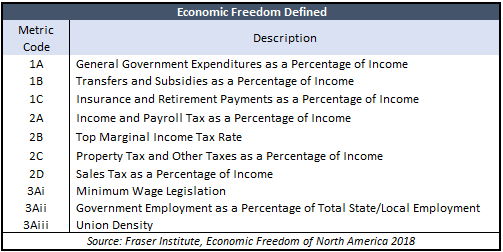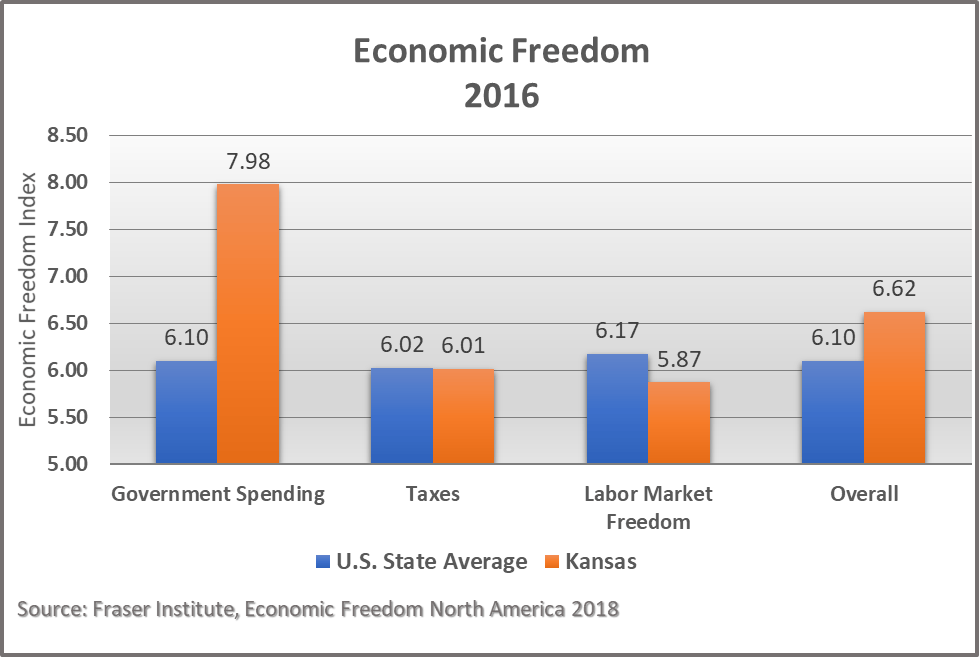Out of all 50 states, Kansas ranked 15th in economic freedom in 2016. The Economic Freedom of North America 2018, published by the Fraser Institute, measures individual states supportive of economic freedom. Kansas tied for 19th in all of North America. The most economically free state is Florida, while the least economically free state is New York. Compared to neighbor states, Colorado ranked 8th, Oklahoma ranked 9th, Nebraska ranked 12th, and Missouri ranked 16th in the country. The economic well-being of citizens is determined by their economic freedom. In fact, the more personal choices citizens have, the higher their life expectancy, the higher their income, and the lower their child mortality and poverty rates.
Economic Freedom Defined
 Economically free economies operate with little government interference while using personal choice to answer basic market functions and needs. The more government imposes restrictions on these choices beyond protective (e.g. national defense) and productive (e.g. transportation infrastructure) functions of government, the less there is less economic freedom. James Gwartney, Robert Lawson, and Walter Block are cited from their book “Economic Freedom of the World, 1975-1995.”
Economically free economies operate with little government interference while using personal choice to answer basic market functions and needs. The more government imposes restrictions on these choices beyond protective (e.g. national defense) and productive (e.g. transportation infrastructure) functions of government, the less there is less economic freedom. James Gwartney, Robert Lawson, and Walter Block are cited from their book “Economic Freedom of the World, 1975-1995.”
Individuals have economic freedom when (a) property they acquire without the use of force, fraud, or theft is protected from physical invasions by others and (b) they are free to use, exchange, or give their property as long as their actions do not violate the identical rights of others. Thus, an index of economic freedom should measure the extent to which rightly acquired property is protected, and individuals are engaged in voluntary transactions.
Three categories define economic freedom: Government Spending (Area 1), Taxes (Area 2), and Labor Market Freedom (Area 3). These 3 categories and a collective of 10 data metrics are compiled for each state.
Kansans set free by slower government spending, held back by higher taxes and labor restrictions.

Government spending was the category that gave Kansans more economic freedom than neighbors in 35 other states. Kansas state government made innovative reforms to government transfers and subsidies in 2016. The Foundation for Government Accountability notes of Kansas reforms to restrict cash assistance to non-disabled adults and to track the jobs of families who leave assistance. Kansans saw more jobs and higher incomes due to stated reforms, stronger child support payments, and lower time limits.
Kansas’s “Taxes” category was tied with the rest of the country in 2016, contrary to the perception of term “Kansas Tax Experiment”. Kansas still had a high marginal income tax rate relative to the nation in 2016. What also did not help was the state’s sales tax as a percentage of income, the eighth highest combined state/local sales tax rate in the country.
A lack of labor market freedom also holds back Kansas from being the most economically free state in the union. Kansas has too much state and local government employment, a share higher than the nation by a margin of 17 percentage points. Kansas having a higher share of government jobs means employers bid against their tax dollars to find qualified employees. It may also mean the Kansas government is providing a service that free individuals and organizations are already supplying. Kansas government monopolizes services, limiting the choice of Kansans through laws and regulations.
Economic Freedom means more choice
Economic freedom allows Kansas to be the most prosperous state in the country. Unfortunately, it is likely that economic freedom in Kansas will fall further as 2017 saw the largest tax increase in state history and saw an extra billion dollars in government spending. If we want to reverse this downward trend then policymakers must continue to return more choices to its citizens; replacing government action with free interactions of the people. Economic freedom is the tool that spurs innovation, wealth and happiness throughout the economy.



